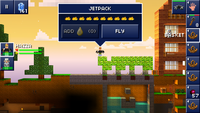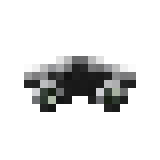Jetpack
- "Soar the skies."
Jetpacks allow a blockhead to fly. They were introduced in version 1.6.
Appearance
Jetpacks are mostly black with wing-like protrusions from the sides. When worn, the wings continue to stick out from the sides of a blockhead. It appears similar to a carbon fiber chest plate with wings, and in fact acts as a piece of armor, reducing damage and taking wear for any damage.
Where Found
A level 4 craft bench is required to make a jetpack.
|
|
The steps required to make a jetpack are some of the most complex in the game, and currently the longest procedure for crafting a single item. A total of 1,000 oil, 300 coal, nine titanium ingots, and a large amount of electricity (to run a refinery) are needed to make all the preliminaries and components. This includes the upgrading of a level 3 craft bench to level 4.
Without crafting surface upgrades, the production of components for a (second) jetpack (2 wings, 2 jets, 1 chassis, 10 fuel) requires exactly 850 oil, 250 coal and nine titanium ingots.
Use

To make a blockhead use a jetpack, it must be worn on the upper body, replacing any shirt, jacket, or chest plate already there. Tapping a jetpack while it is in a blockhead's inventory will offer a button to wear it and displace anything already there; the displaced item will usually transfer to a regular inventory slot, but if the blockhead is in motion it may drop free. Alternately, drag-and-drop can be used to move a jetpack from inventory to worn.
While worn, a jetpack will display as an icon adjacent to the blockhead's inventory display, whether that display is opened or closed. It will be located on the same row/column as the hand or clothing spaces.
When the jetpack icon is selected, it will give an option to "fly". Once this option is tapped, a menu will appear on top of the blockhead wearing the jetpack, giving two more options: "fuel" and "fly". Selecting "fuel" will refuel the jetpack at the expense of one fuel in inventory at a time. Selecting "fly" will allow the blockhead to be moved by tilting the play device.
There are two methods of flying with a jetpack:
- Manual flying allows a blockhead to be directed to any position by tapping on that spot. The blockhead may steer around obstacles and unrevealed areas, and will use doors, trapdoors, and elevators normally. Stairs and ladders will be ignored. Wearing a jetpack and even flying does not inhibit the use of tools, beds, crafting surfaces, or other items. This is similar to how a blockhead walks, using the path-finding algorithms to find the quickest route.
- Tilt flying is where the blockhead wearing the jetpack can be moved by tilting the device. The player may tilt the device forward, backward, left, or right to move a blockhead in the x and y axes. This is similar to riding a donkey or a boat. The jetpack-wearing blockhead must be selected and already be flying to use tilt flying.
A blockhead using a jetpack travels slightly faster than one walking level using south pole boots of speed, but in any direction and without the need for a solid surface.
A jetpack also acts as a piece of armor, protecting a blockhead from attacks and other damage as much as a piece of carbon fiber or titanium armor. Damage from these losses of health will wear out the jetpack.
A jetpack will slowly wear out (displayed as a green bar going red from right to left across the top of the icon, just like other wear bars) during use. It will consume fuel far faster than it wears out.
Jetpacks function normally in space, even though the using blockhead will run out of air.
It is possible to remove the jetpack during flight, but a blockhead will sustain significant injuries if falling six or more blocks onto solid ground. It is also possible to prevent falling injury by equipping the jetpack before impacting with the ground.
Fuel

Jetpacks require fuel to continue operating. Its fuel supply is shown as a yellow bar across the top of its icon just under the wear bar, with red expanding from right to left as the supply diminishes. A newly-made jetpack is fully fueled, and a fully fueled jetpack conceals its fuel bar. Refueling requires the blockhead to have fuel in its accessible inventory and the jetpack worn. It can be refueled during flight. Tapping on either the jetpack or fuel icons will offer the option to add fuel.
A jetpack has capacity for ten fuel. A fully fueled jetpack should be able to run for a full game day before running out. So long as supplies and power are available, fuel can be crafted faster than it is consumed.
| Icon | Name | Fuel |
|---|---|---|
| Fuel |
It is suggested to have access to large quantities of oil, as in the end it will take 100 oil to fully refuel a jetpack!
Notes
The first time a player makes a blockhead put on a jetpack, the player earns the achievement "Jetpack".
Flying makes the search for floating islands and reaching space much easier and faster.
Although a blockhead has no trouble climbing, a jetpack allows greater mobility without inhibiting the use of tools or placing blocks for construction. Flying allows the placement of non-block items such as wire without the need for ladders or "scaffolding" to reach the space.
A jetpack does not provide significant protection against cold, which can become a problem when flying above areas in winter conditions. The North Pole Hat of Warmth is an effective alternative to the unusable fur coat while flying.
When a walking blockhead dons a jetpack, they continue along their previously planned route. But instead of flying normally, they assume a standing posture and travel without moving arms or legs.
In a Trade Portal fuel often costs more than a jetpack itself, so buying a new jetpack may be more cost-efficient than buying fuel.

